
16 September 2024
When volatility hit global stocks in August, and mega-cap tech firms sold off sharply, small-caps proved to be a surprise winner.
The Mexican peso has been one of the strongest performing EM currencies in recent years.
While global technology stocks have suffered badly in recent bouts of market volatility, analysts are upbeat on the sector in emerging Asia.
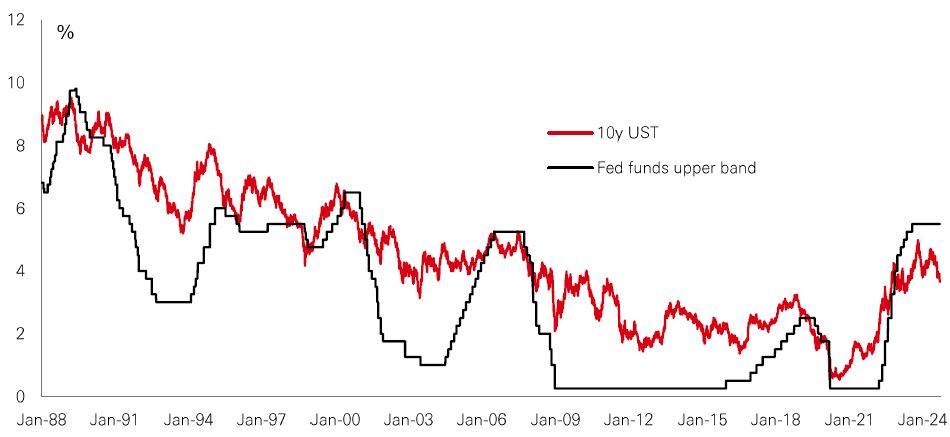
Markets are pricing in an approximate 40% chance of a 0.50% Fed cut on 18 September. This is despite an unexpectedly strong August core inflation print of 0.3% month-on-month. Shelter costs were the main culprit behind the upside surprise. Excluding shelter, core inflation is running at only 1.1% on a six-month annualised basis, suggesting that price pressures are under control and allowing the Fed to put more weight on the labour market leg of its mandate.
Here, the August data were mixed; unemployment ticked down, having jumped in July, but payrolls were softer than expected. Overall, a broad swathe of data suggests the labour market is continuing to cool, but relatively gradually, which helps explain why the overwhelming consensus among economists is for a 0.25% cut. However, the funds rate is at restrictive levels and, based on current market pricing, is only likely to return to a neutral stance around mid-2025.
Given policy acts with a lag, the risk that labour market cooling turns into labour market freezing will remain elevated for some time to come. This alone is likely to lead to further bouts of volatility in markets. And if those risks then crystallise, the Fed will be forced to cut aggressively. So, while Treasury yields have fallen markedly of late, they can still play an important role in hedging portfolios against downside growth scenarios.
Since the 16 July peak of the S&P 500, there has been a significant rotation in performance within the global equity space. Previous winners such as US tech have been lagging, while unloved regions and sectors – value, defensives, EM, and small caps – have taken the lead. For developed markets, this reversal of fortune for UK equities has been particularly striking.
Some analysts think as part of the wider broadening-out story, UK stocks can continue to be a relative winner. The market remains unloved and cheap, with the MSCI UK trading at a significant valuation discount versus its own 10-year average 12m forward PE. The UK market is also defensive, with significant weights in consumer staples and healthcare that can better withstand a deterioration in global economic conditions. And although a stronger pound might be a headwind to export-oriented firms – especially in the large-cap space – this can be offset by cheaper input costs from abroad. With EPS growth expected to jump into double-digits for 2025, the overall profits picture also looks good.
The value of investments and any income from them can go down as well as up and investors may not get back the amount originally invested. Past performance does not predict future returns. The level of yield is not guaranteed and may rise or fall in the future.
This information shouldn't be considered as a recommendation to buy or sell specific sector/stocks mentioned. Any views expressed were held at the time of preparation and are subject to change without notice. While any forecast, projection or target where provided is indicative only and not guaranteed in any way. Source: HSBC Asset Management. Macrobond, Bloomberg. Data as at 11.00am UK time 13 September 2024.
When volatility hit global stocks in August, and mega-cap tech firms sold off sharply, small-caps proved to be a surprise winner. And while the rally in smaller firms has since cooled, it gave us an insight into how quickly small cap value can react to steady growth and the prospect of rate cuts.
Currently, there are deep valuation discounts between smaller caps and large caps (and their own history). Most developed market indices show small- and mid-cap stocks trading 10-25% below their 10-year average measures like price/earnings (PE) and price/book. By contrast, the S&P 500 currently trades at a 30% premium to its 10-year average 12m forward PE. Selection is key.
Europe and Japan look particularly unloved, with the former expecting rate cuts and the latter an eventual return to inflation, boosting nominal profit growth.
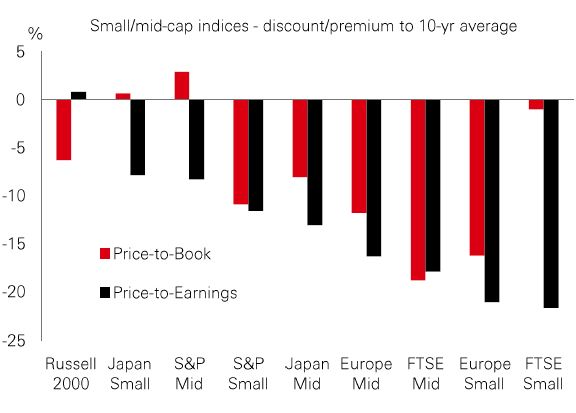
The Mexican peso has been one of the strongest performing EM currencies in recent years. This has come on the back of proactive central bank policy, a solid fiscal position, and strong economic ties with the outperforming US economy. Other more structural factors such as continuing growth in remittances and supply chain ‘nearshoring’ have also played a role.
Against a backdrop of elevated interest rate differentials, the peso has also seen interest from international investors engaging in ‘carry trades’ (where traders borrow in low rate currencies and buy higher rate assets). But this summer’s rapid unwinding of popular carry trades has put significant pressure on the currency, just as factors like domestic politics and the imminent US election have pushed uncertainty higher.
After the recent retreat, it now seems likely the so-called super peso may settle in a new range. Happy Independence Day to our Mexican readers!
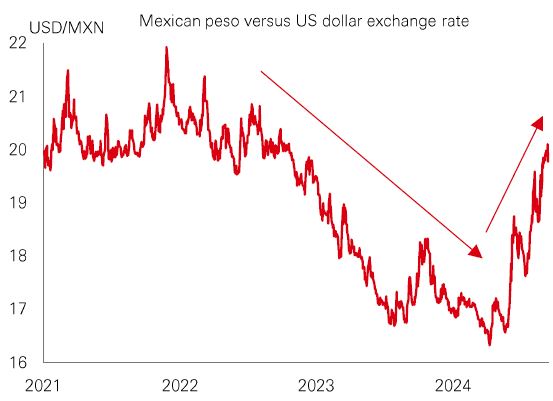
While global technology stocks have suffered badly in recent bouts of market volatility, analysts are upbeat on the sector in emerging Asia. Profit growth expectations have recently picked up on solid international demand for semiconductors and positive profits figures from mainland Chinese tech heavyweights.
But a catch for the region’s tech players is a potential slowdown in global growth. While firms in markets like Taiwan and South Korea have enjoyed years of strong demand, recent sector weakness has revealed some vulnerability to external headwinds and downside growth risks in the US.
The good news for investors is that while tech is expected to remain a profit engine for the region, emerging Asian markets also offer broad sector diversification. Against a backdrop of uncertain global growth, domestically-focused markets like mainland China, India, and ASEAN – where tech has a relatively small overall sector weighting – are less reliant on external demand.
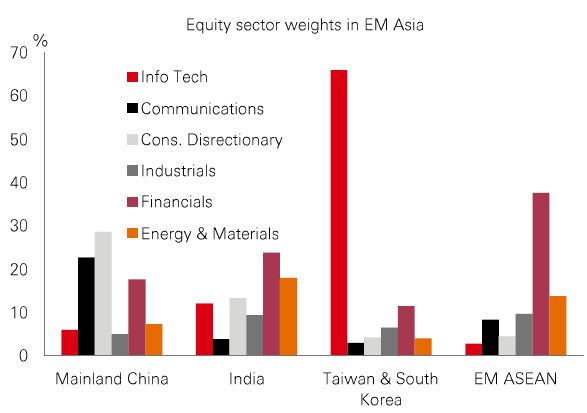
Past performance does not predict future returns. The level of yield is not guaranteed and may rise or fall in the future. This information shouldn't be considered as a recommendation to buy or sell specific sector/stocks mentioned. Any views expressed were held at the time of preparation and are subject to change without notice. Source: HSBC Asset Management. Macrobond, Bloomberg, Datastream. Data as at 11.00am UK time 13 September 2024.
| Last week |
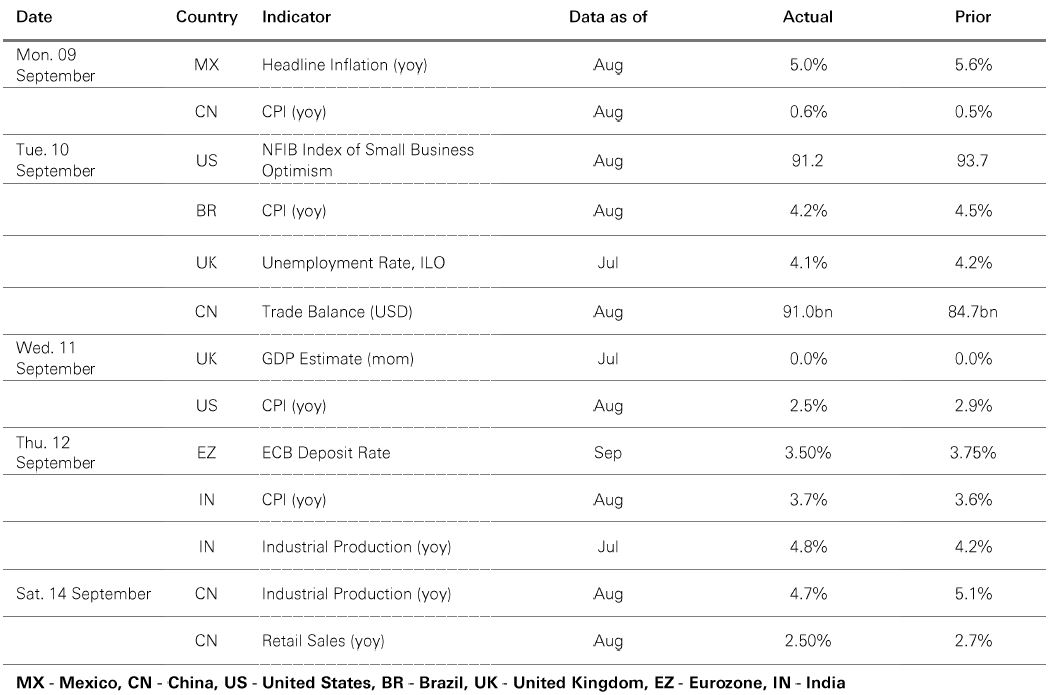
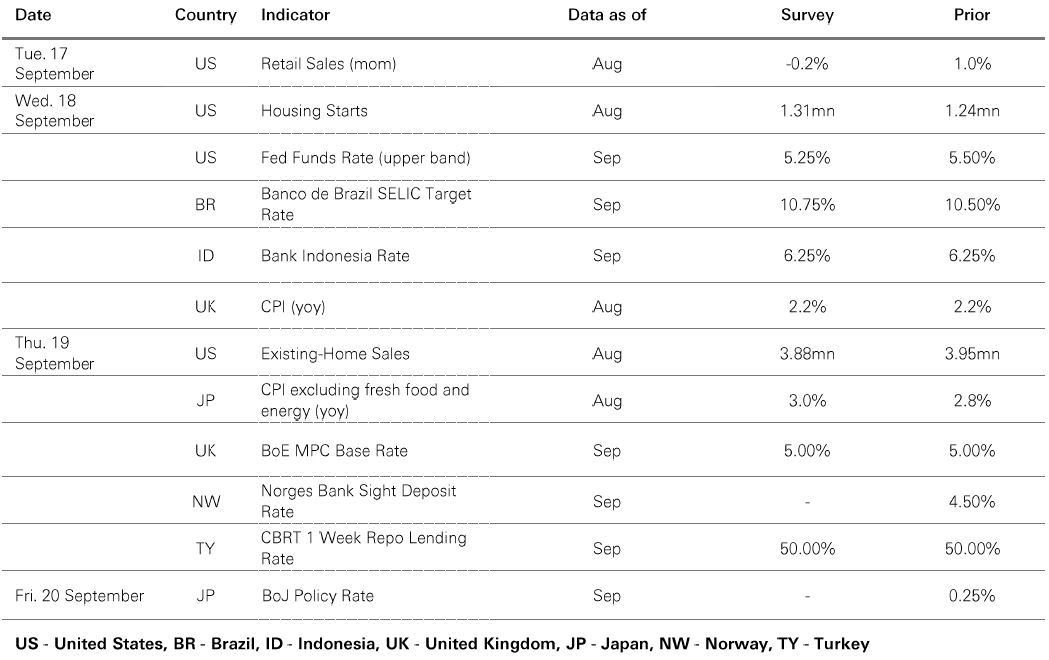
Source: HSBC Asset Management. Data as at 11.00am UK time 16 September 2024. This information shouldn't be considered as a recommendation to buy or sell specific sector/stocks mentioned. Any views expressed were held at the time of preparation and are subject to change without notice.
Risk markets rebounded ahead of the US Fed’s FOMC meeting this week, with rising expectations of a possible 0.50% cut. Core government bonds rallied, with US Treasuries faring better than German Bunds. The European Central Bank delivered a 0.25% cut in the deposit rate, with ECB president Lagarde reiterating that future cuts would remain “data dependent”. The US dollar DXY index fell to a 2024 low. US equities saw a broad-based rally, led by tech stocks, with the Euro Stoxx 50 and Japan’s Nikkei 225 also on course to finish the week higher. In emerging markets, the tech-dominant South Korea Kospi index posted modest gains and India’s Sensex index resumed its upward trend. Ongoing disinflation worries pushed China’s Shanghai Composite index close to 2024 lows. In commodities, oil prices stabilised late last week, after falling sharply on supply concerns. Gold reached fresh historic highs.
Related Insights

Last quarter proved to be an eventful period for investors, as more central banks embarked...[5 Sep]

US recession fears have eased on solid earnings growth along with more constructive labour...[2 Sep]

As expected, the FOMC kept rates unchanged at the July meeting. The Fed funds rate remains...[1 Aug]

This document or video is prepared by The Hongkong and Shanghai Banking Corporation Limited (‘HBAP’), 1 Queen’s Road Central, Hong Kong. HBAP is incorporated in Hong Kong and is part of the HSBC Group. This document or video is distributed and/or made available by HSBC Bank Canada (including one or more of its subsidiaries HSBC Investment Funds (Canada) Inc. (“HIFC”), HSBC Private Investment Counsel (Canada) Inc. (“HPIC”) and HSBC InvestDirect division of HSBC Securities (Canada) Inc. (“HIDC”)), HSBC Bank (China) Company Limited, HSBC Continental Europe, HBAP, HSBC Bank (Singapore) Limited, HSBC Bank Middle East Limited (UAE), HSBC UK Bank Plc, HSBC Bank Malaysia Berhad (198401015221 (127776-V))/HSBC Amanah Malaysia Berhad (20080100642 1 (807705-X)), HSBC Bank (Taiwan) Limited, HSBC Bank plc, Jersey Branch, HSBC Bank plc, Guernsey Branch, HSBC Bank plc in the Isle of Man, HSBC Continental Europe, Greece, The Hongkong and Shanghai Banking Corporation Limited, India (HSBC India), HSBC Bank (Vietnam) Limited, PT Bank HSBC Indonesia (HBID), HSBC Bank (Uruguay) S.A. (HSBC Uruguay is authorised and oversought by Banco Central del Uruguay), HBAP Sri Lanka Branch, The Hongkong and Shanghai Banking Corporation Limited – Philippine Branch, and HSBC FinTech Services (Shanghai) Company Limited (collectively, the “Distributors”) to their respective clients. This document or video is for general circulation and information purposes only.
The contents of this document or video may not be reproduced or further distributed to any person or entity, whether in whole or in part, for any purpose. This document or video must not be distributed in any jurisdiction where its distribution is unlawful. All non-authorised reproduction or use of this document or video will be the responsibility of the user and may lead to legal proceedings. The material contained in this document or video is for general information purposes only and does not constitute investment research or advice or a recommendation to buy or sell investments. Some of the statements contained in this document or video may be considered forward looking statements which provide current expectations or forecasts of future events. Such forward looking statements are not guarantees of future performance or events and involve risks and uncertainties. Actual results may differ materially from those described in such forward-looking statements as a result of various factors. HBAP and the Distributors do not undertake any obligation to update the forward-looking statements contained herein, or to update the reasons why actual results could differ from those projected in the forward-looking statements. This document or video has no contractual value and is not by any means intended as a solicitation, nor a recommendation for the purchase or sale of any financial instrument in any jurisdiction in which such an offer is not lawful. The views and opinions expressed are based on the HSBC Global Investment Committee at the time of preparation, and are subject to change at any time. These views may not necessarily indicate HSBC Asset Management‘s current portfolios’ composition. Individual portfolios managed by HSBC Asset Management primarily reflect individual clients’ objectives, risk preferences, time horizon, and market liquidity.
The value of investments and the income from them can go down as well as up and investors may not get back the amount originally invested. Past performance contained in this document or video is not a reliable indicator of future performance whilst any forecasts, projections and simulations contained herein should not be relied upon as an indication of future results. Where overseas investments are held the rate of currency exchange may cause the value of such investments to go down as well as up. Investments in emerging markets are by their nature higher risk and potentially more volatile than those inherent in some established markets. Economies in emerging markets generally are heavily dependent upon international trade and, accordingly, have been and may continue to be affected adversely by trade barriers, exchange controls, managed adjustments in relative currency values and other protectionist measures imposed or negotiated by the countries with which they trade. These economies also have been and may continue to be affected adversely by economic conditions in the countries in which they trade. Investments are subject to market risks, read all investment related documents carefully.
This document or video provides a high level overview of the recent economic environment and has been prepared for information purposes only. The views presented are those of HBAP and are based on HBAP’s global views and may not necessarily align with the Distributors’ local views. It has not been prepared in accordance with legal requirements designed to promote the independence of investment research and is not subject to any prohibition on dealing ahead of its dissemination. It is not intended to provide and should not be relied on for accounting, legal or tax advice. Before you make any investment decision, you may wish to consult an independent financial adviser. In the event that you choose not to seek advice from a financial adviser, you should carefully consider whether the investment product is suitable for you. You are advised to obtain appropriate professional advice where necessary.
The accuracy and/or completeness of any third party information obtained from sources which we believe to be reliable might have not been independently verified, hence Customer must seek from several sources prior to making investment decision.
Important Information about HSBC Global Asset Management (Canada) Limited (“AMCA”)
HSBC Asset Management is a group of companies, including AMCA, that are engaged in investment advisory and fund management activities, which are ultimately owned by HSBC Holdings plc. AMCA is a wholly owned subsidiary of, but separate entity from, HSBC Bank Canada.
Important Information about HSBC Investment Funds (Canada) Inc. (“HIFC”)
HIFC is the principal distributor of the HSBC Mutual Funds and offers the HSBC Mutual Funds and/or the HSBC Pooled Funds through the HSBC World Selection® Portfolio service. HIFC is a subsidiary of AMCA, and indirect subsidiary of HSBC Bank Canada, and provides its products and services in all provinces of Canada except Prince Edward Island. Mutual fund investments are subject to risks. Please read the Fund Facts before investing.
®World Selection is a registered trademark of HSBC Group Management Services Limited.
Important Information about HSBC Private Investment Counsel (Canada) Inc. (“HPIC”)
HPIC is a direct subsidiary of HSBC Bank Canada and provides services in all provinces of Canada except Prince Edward Island. The Private Investment Counsel service is a discretionary portfolio management service offered by HPIC. Under this discretionary service, assets of participating clients will be invested by HPIC or its delegated portfolio manager, AMCA, in securities, including but not limited to, stocks, bonds, mutual funds, pooled funds and derivatives. The value of an investment in or purchased as part of the Private Investment Counsel service may change frequently and past performance may not be repeated.
Important Information about HSBC InvestDirect (“HIDC”)
HIDC is a division of HSBC Securities (Canada) Inc., a direct subsidiary of, but separate entity from, HSBC Bank Canada. HIDC is an order execution only service. HIDC will not conduct suitability assessments of client account holdings or of the orders submitted by clients or from anyone authorized to trade on the client’s behalf. Clients have the sole responsibility for their investment decisions and securities transactions.
Important Information about the Hongkong and Shanghai Banking Corporation Limited, India (“HSBC India”)
HSBC India is a branch of The Hongkong and Shanghai Banking Corporation Limited. HSBC India is a distributor of mutual funds and referrer of investment products from third party entities registered and regulated in India. HSBC India does not distribute investment products to those persons who are either the citizens or residents of United States of America (USA), Canada, Australia or New Zealand or any other jurisdiction where such distribution would be contrary to law or regulation.
The following statement is only applicable to HSBC Bank (Taiwan) Limited with regard to how the publication is distributed to its customers: HSBC Bank (Taiwan) Limited (“the Bank”) shall fulfill the fiduciary duty act as a reasonable person once in exercising offering/conducting ordinary care in offering trust services/ business. However, the Bank disclaims any guarantee on the management or operation performance of the trust business.
The following statement is only applicable to PT Bank HSBC Indonesia (“HBID”): PT Bank HSBC Indonesia (“HBID”) is licensed and supervised by Indonesia Financial Services Authority (“OJK”). Customer must understand that historical performance does not guarantee future performance. Investment product that are offered in HBID is third party products, HBID is a selling agent for third party product such as Mutual Fund and Bonds. HBID and HSBC Group (HSBC Holdings Plc and its subsidiaries and associates company or any of its branches) does not guarantee the underlying investment, principal or return on customer investment. Investment in Mutual Funds and Bonds is not covered by the deposit insurance program of the Indonesian Deposit Insurance Corporation (LPS).
THE CONTENTS OF THIS DOCUMENT OR VIDEO HAVE NOT BEEN REVIEWED BY ANY REGULATORY AUTHORITY IN HONG KONG OR ANY OTHER JURISDICTION.
YOU ARE ADVISED TO EXERCISE CAUTION IN RELATION TO THE INVESTMENT AND THIS DOCUMENT OR VIDEO. IF YOU ARE IN DOUBT ABOUT ANY OF THE CONTENTS OF THIS DOCUMENT OR VIDEO, YOU SHOULD OBTAIN INDEPENDENT PROFESSIONAL ADVICE.
© Copyright 2024. The Hongkong and Shanghai Banking Corporation Limited, ALL RIGHTS RESERVED.
No part of this document or video may be reproduced, stored in a retrieval system, or transmitted, on any form or by any means, electronic, mechanical, photocopying, recording or otherwise, without the prior written permission of The Hongkong and Shanghai Banking Corporation Limited.
Important information on sustainable investing
“Sustainable investments” include investment approaches or instruments which consider environmental, social, governance and/or other sustainability factors (collectively, “sustainability”) to varying degrees. Certain instruments we include within this category may be in the process of changing to deliver sustainability outcomes.
There is no guarantee that sustainable investments will produce returns similar to those which don’t consider these factors. Sustainable investments may diverge from traditional market benchmarks.
In addition, there is no standard definition of, or measurement criteria for sustainable investments, or the impact of sustainable investments (“sustainability impact”). Sustainable investment and sustainability impact measurement criteria are (a) highly subjective and (b) may vary significantly across and within sectors.
HSBC may rely on measurement criteria devised and/or reported by third party providers or issuers. HSBC does not always conduct its own specific due diligence in relation to measurement criteria. There is no guarantee: (a) that the nature of the sustainability impact or measurement criteria of an investment will be aligned with any particular investor’s sustainability goals; or (b) that the stated level or target level of sustainability impact will be achieved.
Sustainable investing is an evolving area and new regulations may come into effect which may affect how an investment is categorised or labelled. An investment which is considered to fulfil sustainable criteria today may not meet those criteria at some point in the future.